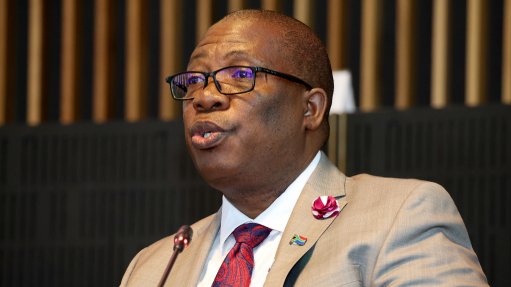Mashatile proposes war rooms on jobs, poverty, governance
Deputy President Paul Mashatile, on April 30, proposed that three “war rooms” on the economy and jobs, on clean governance and on poverty and hunger be established, in line with the three objectives of the Medium-Term Development Plan (MTDP).
The war rooms would not follow normal Cabinet processes, but take a delivery-based approach, with monitoring, deep-dive evaluations and decisive intervention where there was no progress, he said during his speech at the launch of the small business enterprise and supplier development supporting Transformation Fund.
Government and the private sector would be represented in each war room, but, beyond simple representation, this was about accomplishing and obtaining results, Mashatile said.
"The war rooms must meet regularly to track the work being done and report to the larger war room, which I will convene and report to the President," he added.
“Transformation and economic justice require dedication, vision, and a willingness to challenge the status quo. We can make a difference in citizens' lives and create a fairer society through our actions.
“We can build an inclusive economy and transform our society. I am optimistic about our country’s future, indeed by working together we will leave no one behind.”
Further, government plans to host a national dialogue as part of forging an inclusive development future for South Africa.
Conversations regarding economic matters were crucial for fostering inclusive and sustainable development and improving participation in decision-making processes. They facilitated the equilibrium of economic development with social equality, offered an opportunity to rectify inequalities, and fostered a more just and stable society, he added.
The National Dialogue process is an opportunity to establish a social compact with the public, fostering trust and support for the implementation of the MTDP.
It will provide an opportunity to secure stakeholder commitments for collaboration with the government to achieve common goals.
He called on business and government to identify targets and commitments that must be tracked prior to the dialogue.
“As things stand, we might not be in a position to meet all the National Development Plan's 2030 targets, which calls for a focus shift and a modelling exercise – similar to the one that was done by the Gauteng provincial government in developing the Growing Gauteng Together 2030 plan - to ensure all targets are met.
“This will assist in ensuring that we focus on industrialisation and re-industrialisation, which will assist in bringing Africans and black industrialists as critical players in the economy,” Mashatile said.
Further, he exhorted business and government leaders to work hard to pull South Africa's citizens out of poverty by 2055, which would be the centenary of the signing of the Freedom Charter, using lessons learned from China.
“I am introducing the 2055 timeline because the next 30 years must be more decisive, driven by practical interventions in bringing Africans and black people into the economy in more significant ways.
“We must collaborate to eliminate structural barriers and establish equitable opportunities for all. We need to focus on industrial policy, infrastructure investment and social grants to foster inclusive growth and protect vulnerable populations,” he said.
South Africa would not achieve an inclusive economy as long as corruption persisted in the public and private sectors. Corruption hindered the growth of small and medium-sized enterprises by increasing costs, reducing profits and creating uncertainty, Mashatile noted.
“To promote an inclusive economy, we must commit to addressing corruption by strengthening our institutions, fostering transparency and accountability and promoting citizen engagement.
“This includes developing and implementing robust anti-corruption frameworks, strengthening our criminal justice system, and encouraging public participation and oversight.”
Government was committed to fighting corruption, focusing on accountability and transparency and dismantling corrupt networks. This effort included establishing specialised investigative units and strengthening legislation to combat money laundering and fraud, he said.
Article Enquiry
Email Article
Save Article
Feedback
To advertise email advertising@creamermedia.co.za or click here
Announcements
What's On
Subscribe to improve your user experience...
Option 1 (equivalent of R125 a month):
Receive a weekly copy of Creamer Media's Engineering News & Mining Weekly magazine
(print copy for those in South Africa and e-magazine for those outside of South Africa)
Receive daily email newsletters
Access to full search results
Access archive of magazine back copies
Access to Projects in Progress
Access to ONE Research Report of your choice in PDF format
Option 2 (equivalent of R375 a month):
All benefits from Option 1
PLUS
Access to Creamer Media's Research Channel Africa for ALL Research Reports, in PDF format, on various industrial and mining sectors
including Electricity; Water; Energy Transition; Hydrogen; Roads, Rail and Ports; Coal; Gold; Platinum; Battery Metals; etc.
Already a subscriber?
Forgotten your password?
Receive weekly copy of Creamer Media's Engineering News & Mining Weekly magazine (print copy for those in South Africa and e-magazine for those outside of South Africa)
➕
Recieve daily email newsletters
➕
Access to full search results
➕
Access archive of magazine back copies
➕
Access to Projects in Progress
➕
Access to ONE Research Report of your choice in PDF format
RESEARCH CHANNEL AFRICA
R4500 (equivalent of R375 a month)
SUBSCRIBEAll benefits from Option 1
➕
Access to Creamer Media's Research Channel Africa for ALL Research Reports on various industrial and mining sectors, in PDF format, including on:
Electricity
➕
Water
➕
Energy Transition
➕
Hydrogen
➕
Roads, Rail and Ports
➕
Coal
➕
Gold
➕
Platinum
➕
Battery Metals
➕
etc.
Receive all benefits from Option 1 or Option 2 delivered to numerous people at your company
➕
Multiple User names and Passwords for simultaneous log-ins
➕
Intranet integration access to all in your organisation


















